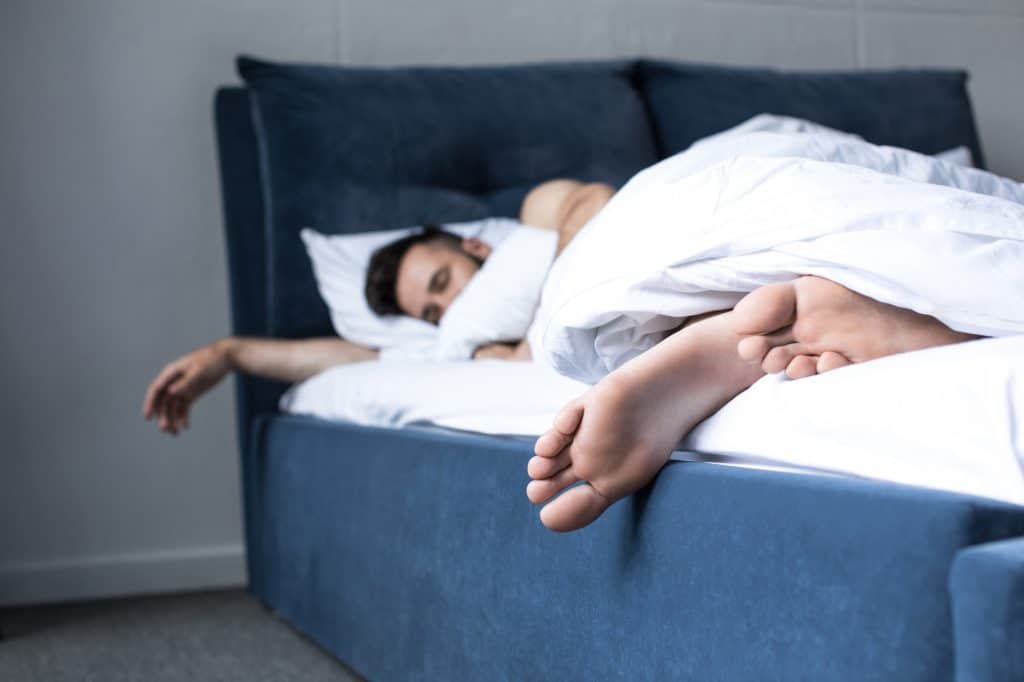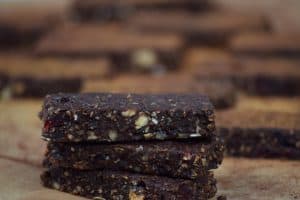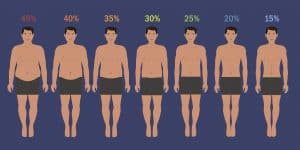Although I was working out like an absolute beast in the gym—I wasn’t making the returns I both expected and deserved.
Something was missing.
Luckily, I found the simplest of answers.
This guide explains why slumber is essential for the ultimate in gains—and how to achieve peaceful sleep every night.
Four Reasons Why Deep Sleep Important for Muscle Growth
We do it every night. In fact—you’ve been sleeping at some point every single day since you’ve been born.
Most of us are aware that quality sleep is essential for our wellbeing—but possibly don’t understand exactly how important it is. Research has indicated that interrupted slumber helps to prevent:
- Infectious diseases.
- Cancer.
- Cardiovascular issues.
- Depression.
- Inflammatory diseases.
- Psychological problems.
Yet in addition to these immense health benefits—for the true fitness addict sleep can prove to be a hidden weapon.
Both directly and indirectly—sleep is essential for maximizing our training returns—especially muscle growth, and avoiding muscle fatigue.
Here are the four main ways that getting your head down promotes phenomenal gains.
1
Protein Synthesis Occurs During Sleep
Protein synthesis is the process by which muscles repair and build.
Exercise, particularly resistance training, places stress on the muscles. In doing so the muscles experience microtrauma—effectively damaging them by creating tiny tears in their structure.
The body then utilizes proteins to rebuild the muscle—which then returns larger and stronger.
Protein synthesis is a constant 24-hour process. However, studies show during nocturnal hours the rate is drastically reduced—due mainly to the lack of amino acids (basically, you’ve utilized them during your waking hours).
Yet, this natural deceleration can be cheated—by consuming certain foods before bedtime (more on that later). Hence, the night hours can be used for achieving sleep for muscle growth.
Conversely, experts have discovered that poor slumber can lead to a catabolic state—where muscles begin to break down and decrease in size.
2
Elevates Testosterone
To understand testosterone’s role in the process of sleep for muscle growth, it’s important to have a basic grasp of the sleeping cycle.
Sleeping involves 4 stages:
- Stage 1: early non-rapid eye movement (NREM)—the border of wakefulness and sleep itself.
- Stage 2: actual NREM—body temperature drops and the heart slows down.
- Stage 3: deep NREM—the time when it’s difficult to wake someone.
- Stage 4: Rapid Eye Movement (REM)—when dreaming occurs.
During slumber, you pass through all four stages—and then start again at stage one in a cyclical process. Each cycle lasts around 90 minutes.
Here’s why this is important.
Testosterone production occurs during REM sleep, especially in the first cycle. Hence, the duration of slumber is essential—you need to reach Stage 4 before waking. Interrupted sleep prevents the production of this important hormone.
Testosterone is required for muscle protein synthesis. It’s the original anabolic steroid. The more you have—the faster and larger your muscles will grow.

3
Boosts HGH (Human Growth Hormone)
HGH is a powerful beast. It’s the hormone which turned you from a two-foot toddler into the towering adult that you are today.
While that vertical growth function has now been “switched off”—HGH is still a mighty tool—it promotes muscle growth.
The issue is, as we mature, our natural production of this hormone declines—meaning for the ultimate in gains you need every ounce of this compound you can get.
Some people use HGH injections or natural supplements to boost growth hormone levels. Yet, similar effects can be achieved by sleeping.
The secretion of HGH (by the pituitary gland) occurs during slumber times—most specifically in the first 90 minutes. Scarily, research indicates that if you miss or experience broken sleep—this HGH surge is abandoned for another 24 hours.
Hence for massive muscle mass—you need to enter dreamland.
4
Improves Performance and Recovery
You already know how a poor night under the sheets can leave you feeling tired and drained. We’ve all experienced it.
Studies indicate that having insufficient sleep depletes the amount of energy you have the following day. What’s more, it also reduces focus, concentration, and mental determination.
These factors will inhibit your muscle growth—the more tired you are, the less likely you are to hit the gym. Even if you do make it to the bench—you’re workouts are likely to be lackluster.
Furthermore, slumber is essential for muscle recovery and can lower the risk of injury. Too few hours in the land of nod and those muscles will be sore and unworkable—inhibiting gains.
10 Tips to Ensure Better Sleep for Muscle Growth

If I was to give you one main piece of advice it would be this—consider sleep as part of your training program.
Often, slumber is considered something that’s just “done” every day—like using the bathroom or going to work. Drop that attitude now.
Sleep is as much part of your fitness and training regime as diet, nutrition, and exercise.
Here are the top tips for achieving better sleep for muscle growth.
1
Avoid Alcohol and Caffeine
These are the two drinks that are a definite no-no when trying to obtain perfect slumber.
Caffeine is a stimulant—it will keep you awake. Research shows that consuming up to six hours before bedtime prevents you “dropping-off”. And, don’t just think I’m talking about coffee.
Many of us complete our training sessions in the evening as during the day we’re tied up with work. If you’re using a pre-workout supplement to enhance your exercise performance—be careful.
Most of these supplements include caffeine—sometimes up to 400 mg per serving. This is the same as knocking back four espressos. Ok, you may work out like a machine—but you’re going to struggle to sleep and prevent muscle gains. So, just make sure your pre-workout is stimulant-free.
Furthermore, if you want better sleep for muscle growth—drop the drinking sessions and evening nightcaps.
Alcohol is a two-faced monster. Admittedly, it’s a sedative and usually works to send you off to the land of nod quickly. Yet, it interferes with the quality of slumber and reduces REM sleep—inhibiting muscle growth.
2
Have a Warm Bath or Shower
Studies show that both warm baths and showers speed up the time it takes you to fall asleep.
Furthermore, REM sleep and overall slumber quality are enhanced by pre-sleep bathing. Hence, if you’re only going to have one “cleansing” session after your evening workout—delay it to around 10 minutes before bedtime.
3
Eat Something
For a long time—the advice has been not to eat before sleep—the consensus being it promoted weight gain.
However, recent studies have found that this isn’t strictly true. While excessive calorie consumption at night-time can promote excess poundage—nutrient-dense foods have been found to be beneficial.
This is particularly effective in the case of protein. Research illustrates that eating foods high in protein prior to sleep can promote excellent slumber, don’t add on the weight, and leave you feeling more refreshed and energized the following day.
The more energy you have—the more likely you are to hit the weights and work the muscles hard.
Even more positive is the findings that consuming protein before bedtime promotes protein synthesis—actively elevating muscle growth. So, I would strongly recommend consuming casein protein, which is a slow digesting protein, in the powder form or foods that are rich in it like greek yogurt and cottage cheese.
4
Exercise Before Bedtime
A study from 2014 indicates that exercising around 1.5 hours before bedtime induces sleep and promotes improved slumber quality.
However, I know that work, social, or family commitments can make this inconvenient or impossible for many people.
The good news is, whatever time of day you train, sleep quality is still improved. Perhaps not to the extent of later training sessions—but it still has a positive effect.

5
Get Busy Beneath the Sheets
Studies illustrate having sex helps to regulate slumber patterns, induce sleep, and ensure a good night of shut-eye. Additionally, it could (depending on your style) be considered a form of exercise—already discussed as a sleep-promoter.
Furthermore, other research shows that the actual process of orgasming has the same slumber-boosting effect—in both men and women.
There’s even more good news.
The same study indicates that even for those people who are single—self-satisfaction is as effective as love-making.
6
Don’t Sleep Too Much
As with anything in life—you can have too much of a good thing. Better sleep for muscle growth doesn’t mean spending as long as possible being out like a log.
Experts believe that between 7-8 hours is the optimum time for slumber. Those who sleep more than 10 hours were increasingly likely to suffer from:
All of the above are likely to reduce training time and therefore impinge on your gains.
7
Keep to a Sleeping Schedule
As discussed, getting 7-8 hours of sleep every night is important. However, equally essential is when you’re taking this slumber.
Don’t think that as long as you’re hitting this hourly target you’re obtaining the ultimate in better sleep for muscle growth.
It can be tempting to spend an evening binge-watching your favorite box-set, reading just one more chapter of your book, or staying out late with the guys or girls. But, if you’re not keeping to the same sleeping schedule everyday—you’re ruining your training returns.
Research shows that those with an irregular slumber pattern suffer from both poor sleep quality and daytime drowsiness. Always go to bed at the same time every night.
There’s more bad news.
Due to the 24-hour society in which we live—many of us have to work alternating shifts. Studies illustrate that shift-workers experience substandard sleep quality, elevated chance of cardiovascular disease, and impaired mental performance.
Hence, wherever possible, avoid shift work to achieve better sleep for muscle growth. If this is out of the question—ensure you follow all the other tips in this article to minimize adverse slumber issues.
8
Your Bed Is Only for Sleeping
When you’ve completed your optimum pre-slumber routine (including eating protein, avoiding caffeine, bathing, and exercising)—get into bed and go to sleep. That’s what your bed is for.
Your bedtime isn’t for watching TV, catching up with social media, or texting friends.
Both TV and smartphone use have been proven to not only prevent swift “dropping off” but also lower sleep quality and promote intermittent slumber.
If you’re not going through your full sleep cycle—you’re not building muscle.
9
Get Some Sunlight During the Day
Your body has its own internal clock—the circadian rhythm. When it’s looked after it controls the time your body is awake and when it’s asleep.
Getting out into the sunlight during daytime hours keeps this clock “ticking” correctly—ensuring when the sun goes down and its bedtime you’re ready for sleep.
So, wherever possible, get out during the daytime and into the sun. If you’re in an office or factory environment—use your breaks to go for a brisk walk in the great outdoors.
However, in some forms of employment, this may be difficult or impossible. Plus, your geographical location can also restrict the amount of available sunlight.
In these circumstances, use a substitute. Research shows that artificial “sunlight” bulbs, which can be used indoors, actively increase sleep quality.

10
Supplementation and Nutrition
There are some excellent supplements on the market that are designed to promote better sleep for muscle growth.
Listen—I’m not talking about prescription sleeping tablets here. Admittedly, they’re necessary for some people with serious insomnia issues. Yet, some drugs such as doxylamine and diphenhydramine can come with a whole host of side effects and reduce sleep quality.
However, natural supplementation, or consuming a diet high in slumber-promoting nutrients—can provide enhanced sleep performance.
The key compounds to concentrate on are:
- Calcium—stimulates l-tryptophan which produces the sleep-promoting melatonin.
- Magnesium—studies show it promotes deep and refreshing slumber.
- Vitamin D—increases sleep quality and duration.
- Glycine—an amino acid which promotes slumber and elevates its rewards.
- L-theanine—promotes relaxation and induces sleep.
The Takeaway
If you’re working out like a machine in the daytime—but not getting sufficient and quality sleep—you’re doing yourself a massive disservice.
Peaceful slumber is one of the best ways to enhance your training gains—and it’s free.
Utilizing the tips included in this article is the easiest way to maximize your returns and obtain the physique you desire.
Remember—sleeping is as much part of your training regime as lifting the weights. Give it the respect it deserves and it will repay you tenfold.













